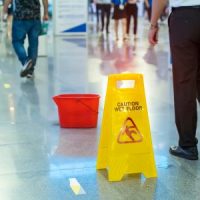What Is A “Transitory Foreign Substance” & Why Does It Matter?

In Florida, if a person sustains an injury while they are on someone else’s property, the property owner or operator may be held liable if they failed to make their premises safe. This maxim does apply in slip-and-fall cases – except for in cases where the injured plaintiff slipped and fell while inside a business establishment. Florida’s legislature has carved out an exception to the common-law duty owed by a premises owner.
Protecting Industry In Florida
Florida law has established three categories of visitors under a legal theory called premises liability: invitees, licensees, and trespassers. Invitees are owed the highest duty of care from a landowner; namely, the owner must make their premises safe, or at least warn invitees of the danger if it cannot be corrected. Licensees – those who are on the premises for their own business – are owed a less stringent duty, and trespassers are only owed a duty for the landlord to refrain from intentionally injuring them.
Historically, these rules applied in any case where a person was injured on another person’s premises. However, in 2010, a law was passed in Florida relating to business establishments that greatly increased the obligation on the injured plaintiff. The statute holds that if a person slips on a “transitory foreign substance” in a business, they must show that the business had “actual or constructive notice” of its presence and did nothing to remedy it. (A “transitory foreign substance” can be anything from melted butter to oil to clothing fallen off a rack.)
Establishing Fault Is Required
The rationale for passing the law was to help shield Florida businesses from exorbitant jury awards in cases of negligence. However, it creates a very heavy burden on an injured person, who may have been in the business for mere moments before slipping (and thus have no real ability to know if the business was negligent or not). If fault cannot be established, an injured plaintiff has no real recourse against the business in many cases.
The law does state that a person can establish ‘constructive’ knowledge of the substance’s presence in two ways: (1) by showing that it was there so long that ordinary care would have illuminated its presence; and/or (2) the substance being present happened with such regularity that the establishment should have expected it. However, both of these may be difficult to establish for someone who was not a regular visitor to the premises. An experienced attorney on your side can sometimes help improve a person’s chances of recovery.
Call A Tampa Premises Liability Attorney
If you have been injured after slipping on a “transitory foreign substance,” you may be overwhelmed by medical bills and unsure how to proceed. A Tampa premises liability attorney from the Rinaldo Law Group can offer knowledgeable and compassionate representation during what can be a difficult time in your life. Call our office today for a free consultation.
Source:
casemine.com/judgement/us/591497a4add7b049345f6f31
